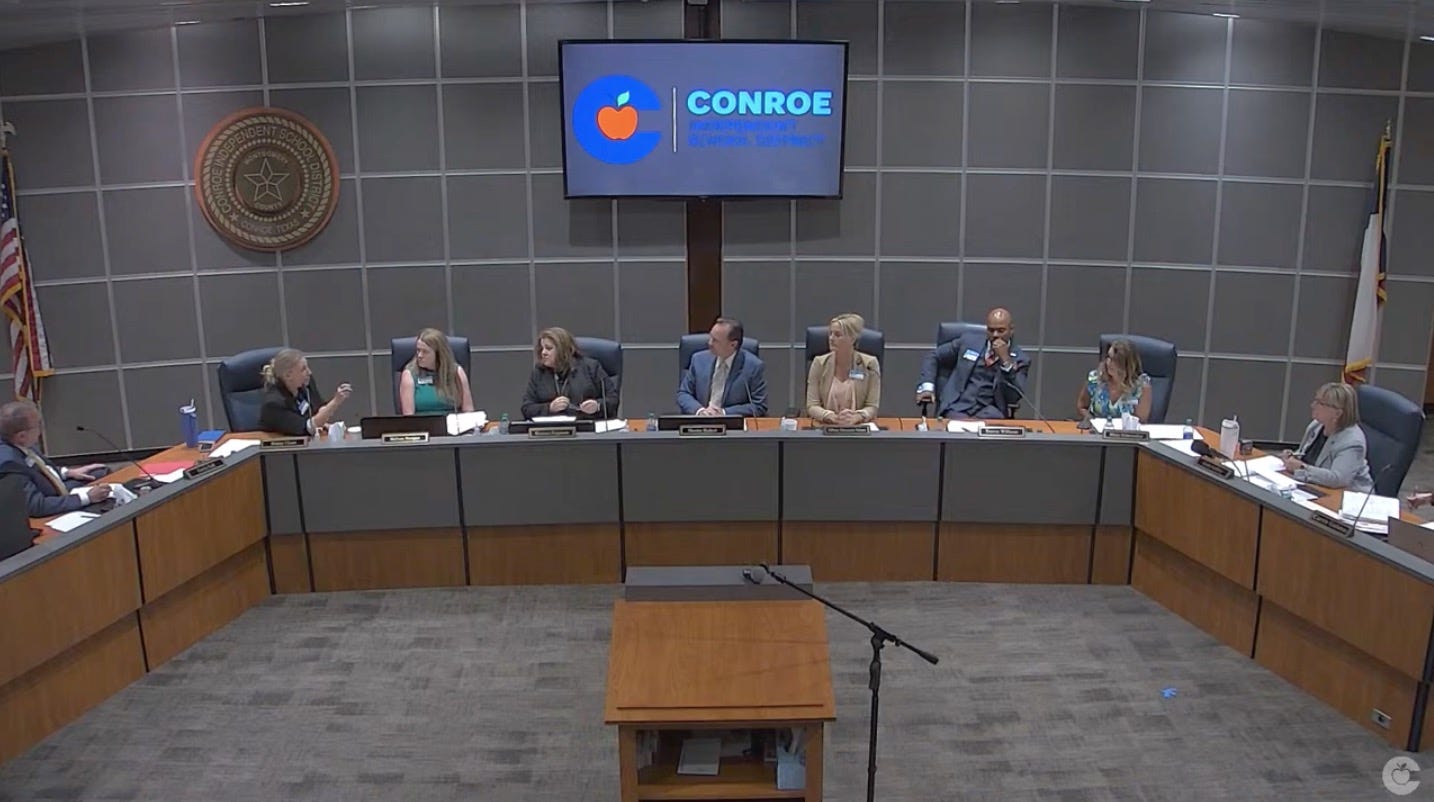"What Are We Doing Here? These Are Classics."
Conroe ISD votes not to restore 19 books to classroom collections in a hearing that laid bare the flaws in its internal review process.



“Collateral damage.”
In a Tuesday night meeting that stretched into early Wednesday, the Conroe Independent School District board of trustees voted not to return nineteen books to classroom collections after a grievance hearing on the district’s internal review process.1 Members of the board majority argued that, though they may or may not agree with the results of the process, the internal review committee had followed district policy.2 But a majority of board members also expressed misgivings with that process—specifically with the fact that it allows books to be removed by committees who have not read the works in their entirety. “It’s obvious that our [policy] changes that we took from Katy have caused collateral damage,” said trustee Theresa Wagaman. “I think it’s very important to make a decision on the complaint we have before us and then come back and see how we can clean up all of this damage at a later time.”
At the end of the night, Wagaman requested the board re-evaluate its book policies, EFA Local and EFB Local, and procedures at a future meeting.
All classroom copies of the nineteen books will now be disposed of by the district. There appears to be no further mechanism in current board policy that could reverse the removal decisions. The nineteen books under appeal last night were:
Beloved (Toni Morrison)
The Bluest Eye (Toni Morrison)
Brave New World (Aldous Huxley)
The Color Purple (Alice Walker)
Extremely Loud and Incredibly Close (Jonathan Safran Foer)
Girl in Translation (Jean Kwok)
The Hate U Give (Angie Thomas)
Homegoing (Yaa Gyasi)
I Am Not Your Perfect Mexican Daughter (Erika L. Sánchez)
The Kite Runner (Khaled Hosseini)
My Sister’s Keeper (Jodi Picoult)
The Perks of Being a Wallflower (Stephen Chbosky)
Salvage the Bones (Jesmyn Ward)
Slaughterhouse-Five (Kurt Vonnegut)
Sold (Patricia McCormick)
Speak (Laurie Halse Anderson)
The Underground Railroad (Colson Whitehead)
We Are the Ants (Shaun David Hutchinson)
Where the Crawdads Sing (Delia Owens)
The hearing resulted from a last-ditch effort by four Conroe ISD parents and educators to save the books, which were removed through the district’s internal review process. At March’s board meeting, community members pointed out that, while book challengers can appeal district decisions to retain books under policies EFA and EFB Local, there is no such process in those policies for challenging a decision to remove books. District administrators responded that the formal grievance process, outlined in policies DGBA, FNG, and GF, offered the only opportunity to appeal such a decision.
But in both the Level 2 hearings on the books and in last night’s final appeal, the district argued that trustees could not overturn the internal review committee’s decisions, because the committee had not violated the procedures set forth under EFA Local.
Notably, the district did not argue that the committee had made correct decisions. “The informal committee made the best decisions they could,” Dr. Jarod Lambert said, representing the district. He noted that the educators of the committee took their task seriously.
“I encourage you to both respect and validate their work. To do otherwise, I respectfully suggest, would require a change in policy,” said Lambert.
“How is that not appropriate for instruction?”
Board member Stacey Chase seemed exasperated with the idea that district policy, properly followed, could result in the removal of this batch of books, which include National Book Award winners, Pulitzer and Nobel Prize winners, and texts that regularly appear on the Advanced Placement English Literature exam. She pointed specifically to Alice Walker’s The Color Purple, and asked, “How is that not appropriate for instruction? What is if not that?”
“What are we doing here?” she asked at another point. “These are classics.”
She returned to a point made by one of the complainants, who asked, “Can administrators act with good intention and still generate a wrong outcome?”
Trustee Datren Williams pointed out that 47% of the books under appeal were either written by authors of color or dealt with LGBTQ themes. While this set of titles was selected by the complainants, authors of color and LGBTQ topics are disproportionately represented in the district’s book removals under both EFA and EFB Local.3 “We have an inherently racist policy,” he said.
In their addresses to the board, the four complainants—AP English teacher Theresa Neman,4 former teacher DeDe Fox, librarian Andrea Yang, and district parent Erin Miller—highlighted numerous flaws in the review process. They pointed out, for example, that committee members who deemed the books educationally unsuitable were not required to read the books in question; that, though all of the books in question were high-school-level books, the committee did not include any high school English teachers or librarians; and they argued that—contrary to Lambert’s assertion—the committee did not always approach its task with the careful consideration it deserved.5
All four complainants emphasized the quality of the texts in question, with Yang speaking movingly about the history of Slaughterhouse-Five and Fox reading a powerful passage from Laurie Halse Anderson’s Speak. Neman’s statement summed up the complainants’ request:
“Boards and districts are Constitutionally required to consider the entirety of the work, not merely excerpts. Our policy requires the reviewer to consider the entirety of the work, not merely excerpts. I ask you to consider these works yourselves. When we consider the work as only its pieces, and not the sum of the whole, we ignore the multifaceted aspects that make the work a statement about living, a builder of empathy.”
But it was the need to read books in their entirety that drew the greatest emphasis from the complainants, and seemed to resonate most with the trustees. “How do you know if the process was followed if you haven’t read the books?” Chase asked Hubert near the end of the discussion.
Policy & Internal Review Process Under Fire
Seven of the nineteen books were found to be in violation of both EFA Local and EFB Local after informal challenges, and have been removed from both classrooms and libraries.6 The rest, according to the district, were removed from classrooms—not libraries—after an internal review committee began auditing books that are typically found in classroom collections. At Tuesday’s hearing, the district estimated that it has audited around 5000 books as a part of this process.
According to documents from the Level 2 grievance hearings for these books, the internal review committee consists of fourteen individuals, eleven of whom have classroom teaching experience. But the district conceded in Tuesday’s hearing that none have experience teaching the books in question, and the complainants pointed out the committee included only one library coordinator and two English-Language Arts representatives, both at the elementary level. What’s more, the Level 2 documents revealed that not all committee members read the books, and that, “due to the volume of books under review, teachers were paid to read the books and provide information to the Committees.”
“I agree that’s something we should look at,” said trustee Melissa Dungan, one of the three “Mama Bear” trustees who campaigned in part on a promise to remove inappropriate books from Conroe schools. Board president Hubert recommended reviewing the policy. “What I would love to do is come back later and discuss the policy that we put in place,” he said.
A Net, Not a Hook
If Tuesday’s hearing leads the district to significantly revise its current EFA and EFB Local policies or internal review process, then the complainants will end up achieving a significant victory. The current policies have been revised multiple times since the fall of 2022, and those revisions have made it easier to remove books quickly and indiscriminately. Stephana Ferrell, of the Florida Freedom to Read Project, has described policies like Conroe ISD’s as “a net, not a hook,” and pointed out that they can catch up quality books in attempts to remove “educationally unsuitable” ones. Community members in Conroe, too, have warned that the new policies would result in books being removed haphazardly or without consideration for their classroom value. Tuesday’s hearing provided evidence that that has, in fact, happened.
But if the possibility of future changes provides some hope for the complainants, the night’s immediate results were disappointing. I spoke to Neman, the complainant, before the hearing, and she told me about the ways teachers in her school had used Brave New World in a unit on dystopian novels. That’s the last group of students in Conroe ISD who will read that book, she said. Tuesday’s board votes may have cemented that.
After the discussion ended and the votes started, trustee Chase—who said she values some of the books up for discussion so much because she has read them—grew emotional, pleading directly with her colleagues not to vote against all of the books. “I do not believe that these were removed with an appropriate interpretation of our policy as it is written.”
“I trust our committee,” responded “Mama Bear” trustee Tiffany Nelson.
Hubert said, “My issue is this: I haven’t read the books. I wasn’t asked to read the books.” About the review committee, he said, “We asked them to do something, and I don’t feel appropriate to say, Well, you did it wrong.”
But Chase pointed out that upholding the book removals also sends a message to district employees.
“I understand you didn’t read them,” she said of the books in question. “That committee didn’t read them either. But you know who did read them? The AP and English teachers we have in our district that have taught this material year after year. So if you want to support our teachers and our educators in their professional judgment, I would suggest you look toward the history there, rather than this misinterpretation of where we want our district to be.”

For background on this story, please see Faith Bugenhagen’s reporting for the Houston Press. For example: “In Conroe ISD the Books Are Quietly Disappearing Off the Shelves” (2/6/24); “Conroe ISD Trustees Vote To Throw Out Thousands Of Classroom Books” (2/21/24); “Conroe ISD Trustees Discuss How Residents Opposed to Throwing Out Books Can File a Complaint” (3/21/24); and “A Conroe ISD Teacher Is Taking The Fight Against Book Removals Into Their Own Hands” (4/15/24)
Three of the four complaints were dismissed by a 5-2 vote, with trustees Stacey Chase and Datren Williams dissenting from the majority. One complaint failed 4-3, with trustee Theresa Wagaman joining Chase and Williams. Chase also made a motion to specifically restore Slaughterhouse-Five to classrooms; it lost 5-2 as well.
According to PEN America, stories by and about people of color and LGBTQ individuals are overrepresented in book removals across the country, so Conroe ISD isn’t alone in this.
Neman was represented by a proxy participant who read Neman’s prepared statement. Neman was unable to attend because she was scoring AP essays in Cincinnati.
Neman’s statement asserted the library committee dismissed The Kite Runner by saying, “That war ended 20 years ago, and these kids weren’t even alive then.”
These seven books are: The Bluest Eye, Extremely Loud & Incredibly Close, I Am Not Your Perfect Mexican Daughter, Nineteen Minutes, Slaughterhouse-Five, The Kite Runner, and We Are the Ants. Ryan Tsamouris has a good breakdown of the difference between “informal challenges” and “internal reviews” of books in Conroe ISD here.




I'm going to be thinking about this for a while, especially the trustee who said "we have an inherently racist policy." Thanks, as always, for your reporting on this crucial subject.
The damage this is doing to the quality of Texas public school education, the preparedness and competitiveness of our high school graduates, and the professional educator pool Texas will be able to attract will be felt for decades.
Growing up in Texas in the 50s and 60s, I saw Texas’s national reputation improve, largely due to NASA, Texas Instruments, our research universities…lots of economical growth that translates to strengthening public education.
We’re going backwards…we are seen as a joke.